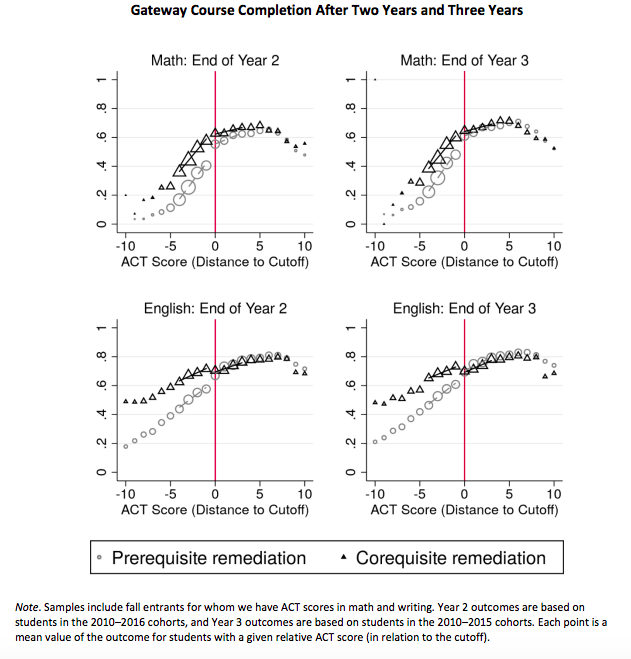Rethinking Remedial Education: New Study Shows College Students Did Better in ‘Corequisite’ Courses Built Around Extra Instruction and Support

A first-of-its-kind study found mixed evidence that a type of reform meant to improve the odds that college students graduate is truly effective.
The researchers homed in on corequisite courses, an instructional model that allows students to skip remedial math and English courses and instead take college-level, or gateway, classes with additional instructional support.
The analysis, conducted by Florence Xiaotao Ran of the Community College Research Center at Columbia University and Yuxin Lin of the University of Southern California, studied eight years of student records at the 13 community colleges under the Tennessee Board of Regents, which in 2015 was the first state collection of higher-education institutions to have corequisite classes systemwide.
“I think the biggest takeaway from this report is that we found very robust evidence that corequisites can improve your outcome in gateway courses,” Ran said. “But it seems that it’s not sufficient enough to improve the overall completion” of students pursuing degrees or wanting to transfer to four-year institutions, the common goals of community college students.
The rationale behind the corequisite model in lieu of traditional remedial courses is that it allows more students to pass their first college-level math and English courses that are crucial to moving along in one’s academic career. Remedial courses, which essentially repeat high school content that students had already learned, have been faulted for dooming the college hopes of legions of students. As many as 70 percent of college students are told they need to take a remedial course, often because they scored too low on a standardized test that colleges require students to take. Few students placed in remedial courses actually end up reaching their gateway courses and are often required to take several remedial classes as part of a series, leading to higher costs and student attrition.
According to the study, students placed into corequisite classes were 15 percentage points more likely to pass a gateway math course and 13 percentage points more likely to pass a gateway English course within one year of enrollment than similar students placed into traditional remedial courses. For the study, students in traditional remedial courses had just missed the cutoff to be placed in college-level courses, suggesting they were more prepared than students in remedial courses who scored worse.

While those findings are consistent with past research comparing the two approaches to student remediation, this study is the first to examine an entire system, which “suggests that corequisite remediation is a scalable approach to improving student success in gateway courses,” the study noted. The authors used advanced research designs to make a causal claim about the effect corequisite courses had on students.
The analysis also compared students in corequisite math and English classes to those who scored high enough on an assessment to enter a traditional college-level class without any remedial support. The findings show that corequisite students completed the gateway course at similar completion rates as those who didn’t need the support in both math and English, affirming claims of advocates who say corequisite courses are a powerful tool for ensuring that more students pass these all-important milestones. This part of the study also compared students who had just made or missed the cutoff for placement.
Additionally, the study shows that students passing a corequisite English course were just as successful in enrolling and passing the next-level course as students who were placed in introductory college-level courses without additional support. In math, corequisite students “were around 8 percentage points more likely to enroll in and pass a subsequent college-level math course compared with similar students placed directly into college-level math,” the study said. This reduces concern that corequisite courses are less academically rigorous, the authors wrote.
Much of the math success among Tennessee students is owed to the kinds of math classes students could take. Until recently, most students took math classes that made heavy use of algebra, like calculus. Critics of that standard pointed to the many careers that made scant use of algebra but instead relied on statistics or quantitative reasoning skills.
Tennessee’s community colleges, like a growing list of others, have begun to give students the option to take math courses that are more closely tied to their career ambitions. Students wanting to major in math, science or technology would still have to take algebra-based courses. But the majority of students wanting careers in other disciplines instead take statistics or math for liberal arts. The upshot is that the share of Tennessee college students enrolled in an algebra-calculus track declined to less than a fifth in 2016, from more than half in 2010.
“This suggests that one key to implementing corequisite math successfully is coordinating it with math pathways reforms, as well as reforms that strengthen pathways to program completion and new student advising,” the study said.
Another major takeaway is that for colleges debating between keeping their traditional remedial pathways or adopting a corequisite model, there’s no downside to going all-in on a corequisite model according to this paper’s data, Ran said. The same is true even for remedial courses focused on algebra-heavy math.
The paper was able to focus on the effect corequisite reform had on students independent of other major changes underway in Tennessee, such as the introduction of a “free college” promise that covered tuition and fees that other forms of financial aid — such as state and federal — didn’t.
Importantly, this paper found no impact on graduation or transfer rates that can be attributed to corequisite courses. That counters another study focused on New York City colleges that did find long-term positive impacts. Ran said one reason could be that Tennessee students were more prepared overall. The state had introduced remedial reforms back in 2006, “so the referencing point could be different in these two states,” she said.
Another reason is that while the New York study focused on 907 students, the Tennessee study examined an entire system. “It is much harder to scale remediation reform due to many hidden constraints and costs,” Ran said, pointing to a RAND study showing the large-scale implementation challenges in Texas after the state adopted far-ranging corequisite reforms in 2017.
Her study also followed just one cohort for three years to see if they graduated or transferred, and it’s possible other cohorts will show more positive long-term results. Nor could the study assess whether one type of corequisite approach showed different long-term results than another.
More critically, she said that the study shows that as a student moves beyond the gateway courses, “colleges do need to provide holistic support for students to navigate their way to the end point of college.”
One example of such an approach, at least for full-time students, is the Accelerated Study in Associate Programs model at the colleges of New York City. Recent studies show that that model can double the percentage of students who earn an associate’s degree, thanks to a combination of public transportation passes, increased advising and additional financial aid.
Get stories like these delivered straight to your inbox. Sign up for The 74 Newsletter

;)